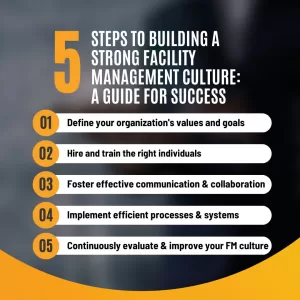Introduction: The importance of a strong facility management culture
Facility management is a critical component of any successful business operation. It encompasses a wide range of services, including maintenance, security, and housekeeping. Building a strong facility management culture is essential for organizations to ensure the smooth operation and efficiency of their facilities. By following a strategic approach and implementing the right practices, facility management companies can create a culture that values excellence and promotes continuous improvement. In this article, we will explore five key steps that can help organizations build a strong facility management culture and achieve long-term success. Whether you are in Mumbai, Bangalore, or any other city, these principles apply to all facility management companies.
Step 1: Define your organization’s values and goals
To build a strong facility management culture, the first step is to define your organization’s values and goals. This will lay the foundation for the culture you want to create within your facility management team. Start by identifying the core values that are important to your organization. These values should align with your overall business objectives and reflect the desired behaviors and attitudes of your facility management team. Once you have defined your values, it’s important to communicate them to your team and ensure they are understood and embraced by all. This can be done through regular team meetings, training sessions, and clear communication channels. By setting clear goals and expectations, you can empower your team to work towards a common vision and drive the desired culture within your facility management organization.
Step 2: Hire and train the right individuals
Once you have established the values and goals for your facility management culture, the next step is to hire and train the right individuals who will contribute to this culture of success. When hiring, it is important to look for candidates who not only possess the necessary technical skills and experience but also align with your organization’s values. Consider conducting behavioral interviews to assess their attitude, problem-solving abilities, and teamwork skills. Once you have selected the right individuals, invest in their training and development. Provide them with the necessary resources and tools to succeed in their roles. This can include on-the-job training, mentoring programs, and continuous professional development opportunities. By hiring and training individuals who embody your organization’s values, you will be nurturing a strong facility management culture that is built on a foundation of qualified and motivated professionals.

Step 3: Foster effective communication and collaboration
Effective communication and collaboration are essential components of building a strong facility management culture. Once you have hired and trained the right individuals, it is important to create an environment that encourages open and transparent communication. Establish regular communication channels, such as team meetings and email updates, to keep everyone informed about relevant information and progress. Encourage team members to share their ideas, suggestions, and concerns, and ensure that their voices are heard and valued. In addition to communication, encourage collaboration among team members. Provide opportunities for cross-functional projects and teamwork, where individuals can work together to solve problems and achieve common goals. Foster a culture of cooperation and mutual support, where everyone feels comfortable collaborating and brainstorming ideas. By fostering effective communication and collaboration, you will facilitate knowledge sharing, enhance problem-solving abilities, and foster a sense of cohesion and unity among your facility management team.
Step 4: Implement efficient processes and systems
Implementing efficient processes and systems is a crucial step towards building a strong facility management culture. By streamlining operations and eliminating unnecessary steps, you can improve productivity and ensure that tasks are completed in a timely manner. Start by assessing your current processes and identify areas where improvements can be made. Look for ways to automate repetitive tasks or use technology to streamline workflows. Implement a facility management software that can centralize information and provide real-time updates on tasks and projects. Furthermore, establish clear standards and guidelines for how tasks should be performed. This will help create consistency and ensure that everyone is working towards the same goals. Regularly review and evaluate your processes and systems to identify areas for improvement and make necessary adjustments. By implementing efficient processes and systems, you can increase efficiency, reduce errors, and create a culture of continuous improvement within your facility management team.
Step 5: Continuously evaluate and improve your facility management culture
Building a strong facility management culture is not a one-time effort. It requires ongoing evaluation and improvement to ensure that it remains effective and aligned with the goals of your organization. Regularly assess the performance of your facility management team and identify areas where improvements can be made. This can be done through performance evaluations, feedback from stakeholders, or even benchmarking against industry standards. Additionally, encourage open communication within your team to gather insights and suggestions for improvement. By creating a culture where feedback is valued and acted upon, you can foster innovation and ensure that everyone has a voice in shaping the facility management culture. As you identify areas for improvement, implement targeted training and development programs to enhance the skills and knowledge of your team members. This will not only improve their performance but also contribute to the overall growth and success of your facility management culture. Remember, building a strong facility management culture is a continuous journey. Embrace change, adapt to new technologies and best practices, and always strive for excellence.
Conclusion: Building a strong facility management culture is a key component of organizational success.
Building a strong facility management culture is a key component of organizational success. In this guide, we have explored the five essential steps to building a strong facility management culture. By following these steps, you can create a culture that promotes efficiency, productivity, and innovation within your organization. We began by emphasizing the importance of setting clear goals and values that align with your overall organizational objectives. We then discussed the significance of hiring the right people who embody these values and have the necessary skills and expertise. Next, we delved into the significance of effective leadership and communication in fostering a positive facility management culture. By empowering your team and fostering open and transparent communication channels, you can nurture a culture of trust and collaboration.
SILA adopts a tech-driven approach, utilizing Robotics and IoT, Automated Compliance Management, and our proprietary technology (SILA Connect) to efficiently manage properties across India. As pioneers in technology within the facility management sector, SILA stands out as one of the best facility management service provider in India.
To delve deeper into our integrated facility management services, click here.
Industries We serve –
Commercial Offices & Buildings | Manufacturing & Heavy Industrial Facilities | Residential Complexes & Townships | Hotels & Campuses | Airports & Malls | IT Parks & Data Centers | Warehousing & Logistics Parks | Banks & Retail
Present in 125 cities –
Ahmedabad | Baroda | Bengaluru | Chennai | Bhubaneswar | Delhi | Gurugram | Noida | Kolkata | Hyderabad | Kochi | Mumbai | Pune & more
Get a free quote today, to reduce your facility management cost.
1. What are soft services in facility management?
Soft services encompass a range of human-centered services aimed at creating a comfortable, secure environment. These services primarily involve human interaction and contribute to enhancing the overall ambiance. Examples include housekeeping, payroll management, pest control, front office management, pantry services, front desk support, and horticulture.
2. What are the hard services in facility management?
Hard services in facility management refer to the physical and structural elements that are essential for the operation, functionality, and maintenance of a facility. These services typically involve machinery, systems, and infrastructure. Some examples of hard services include mechanised cleaning services, managing & maintaining HVAC and Electrical Systems, Plumbing and Water Management, Fire Safety and Security Systems, Waste Management etc.
3. How does outsourcing Facility Management lead to cost savings?
Facility Management proves to be cost-effective. Managing spaces in-house can incur significant expenses. However, outsourcing it not only reduces the time your staff spends overseeing facility operations but also results in long-term savings.
4. What is mechanized housekeeping?
Mechanized housekeeping refers to the use of machinery, equipment, and automated tools in performing various cleaning tasks and maintenance activities within a commercial or residential space. This approach involves the use of specialized cleaning equipment such as vacuum cleaners, floor scrubbers, polishers, steam cleaners, pressure washers, and robotic devices designed to automate or simplify cleaning processes.
5. How does Facility Management play a key role in an organization's success?
Facility Management (FM) plays a pivotal role in an organization’s success by contributing to various aspects that directly impact efficiency, productivity, and overall performance. FM ensures that the physical workspace, infrastructure, and systems are well-maintained, safe, and conducive to work. A properly managed facility promotes productivity among employees by providing a comfortable and efficient working environment.
About SILA -
A Real Estate platform driven by an entrepreneurial spirit.
Our businesses include Real Estate Services which offer Facility Management, Contracting Solutions and Real Estate Advisory. Our other business is Real Estate Development. We have a diverse client base in various sectors which include large Corporates, Real Estate Funds, Landowners and Developers.
Over the last decade, SILA has scaled efficiently, managing over 150 million square feet of assets, with over 20,000 employees pan India. The platform is backed by Norwest Venture Partners and Samara Capital Group in our Real Estate Services and Development arms, respectively.
SILA is one of the best facility management service provider in Mumbai, Bengaluru, Delhi, Chennai, Hyderabad, Pune & more.
SILA is among the top facility management companies in India, offering comprehensive property management services and housekeeping solutions. As a leading facilities management company, SILA provides tailored FM solutions, including housekeeping services in Mumbai. Leveraging our expertise, we ensure seamless property management for clients nationwide. Whether you require housekeeping agency support or specialized facility management solutions, SILA delivers excellence in every aspect of your property’s upkeep and maintenance.

Aniket Sheth
About Author -
The insightful content in this blog is curated by Aniket Sheth, our esteemed Senior Vice President of Operations. With an impressive professional journey spanning over 13 years, Aniket has held key positions at prestigious brands, showcasing his exceptional leadership skills.
Aniket’s educational background is marked by an MBA from Cornell University, which laid the foundation for his successful career. He began his professional journey at EY in New York, contributing significantly to enhancing and implementing engagements for Fortune 500 companies.
Aniket’s strategic acumen, proficiency in asset management, and forward-thinking innovation have been instrumental in helping companies streamline their operations and achieve substantial cost reductions. His wealth of experience brings a unique perspective to the world of facilities management, making his insights invaluable for businesses seeking operational excellence.


